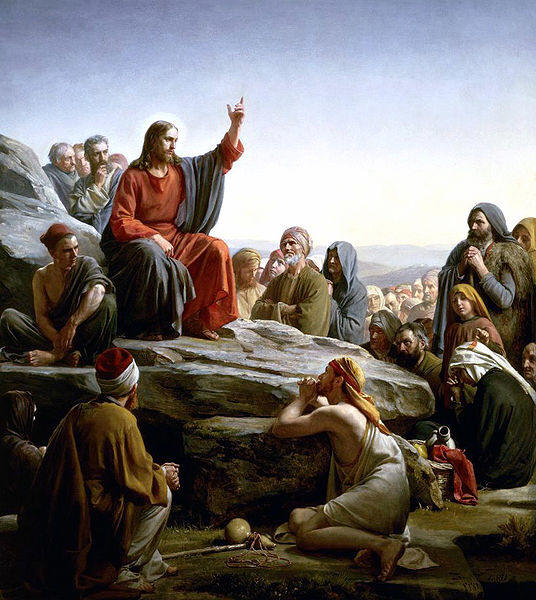The Beatitudes Explained

The Beatitudes Explained
The Beatitudes are sayings attributed to Jesus, and in particular eight blessings recounted by Jesus in the Sermon on the Mount in the Gospel of Matthew, and four in the Sermon on the Plain in the Gospel of Luke, followed by four woes which mirror the blessings. Each is a proverb-like proclamation, without narrative. In the Latin Vulgate, each of these blessings begins with the word beati, which translates to “happy”, “rich”, or “blessed” (plural adjective).
The corresponding word in the original Greek is µa?????? (makarioi), with the same meanings. Thus “Blessed are the poor in spirit” appears in Latin as beati pauperes spiritu. The Latin noun beatitudo was coined by Cicero to describe a state of blessedness and was later incorporated within the chapter headings written for Matthew 5 in various printed versions of the Vulgate. Subsequently, the word was anglicized to beatytudes in the Great Bible of 1540, and has, over time, taken on a preferred spelling of beatitudes.
The Beatitudes unique to Matthew are the meek, the merciful, the pure of heart, and the peacemakers, while the other four have similar entries in Luke, but are followed almost immediately by “four woes”. The term “poor in spirit” is unique to Matthew. While thematically similar the introduction of the phrase “Poor in spirit” spiritualizes or ethicizes the poor in their predicament (in alignment with Isaiah 61) while the Lucan version focuses on their actual hardship, poverty, marginalization and rejection of the poor who will see eventual vindication.
Each Beatitude consists of two phrases: the condition and the result. In almost all cases the phrases used are familiar from an Old Testament context, but in the Sermon on the Mount Jesus elevates them to new levels and teachings. Together, the Beatitudes present a new set of ideals that focus on love and humility rather than force and exaction. They echo the highest ideals of Jesus’ teachings on spirituality and compassion. The term “the meek” would be familiar in the Old Testament, e.g., as in Psalm 37:11. Although the Beatitude concerning the meek has been much praised even by some non-Christians such as Mahatma Gandhi, some view the admonition to meekness skeptically.
Friedrich Nietzsche in On the Genealogy of Morals considered the verse to be embodying what he perceived as a slave morality. In Christian teachings, the Works of Mercy, which have corporal and spiritual components, have resonated with the theme of the Beatitude for mercy. These teachings emphasize that these acts of mercy provide both temporal and spiritual benefits. The theme of mercy has continued in devotions such as the Divine Mercy in the 20th century.
The term “peacemakers” has traditionally been interpreted to mean not only those who live in peace with others, but also those who do their best to promote friendship among mankind and between God and man. St. Gregory of Nyssa interpreted it as “Godly work”, which was an imitation of God’s love of man. John Wesley said the peacemakers ‘endeavour to calm the stormy spirits of men, to quiet their turbulent passions, to soften the minds of contending parties, and, if possible, reconcile them to each other. They use all innocent arts, and employ all their strength, all the talents which God has given them, as well to preserve peace where it is, as to restore it where it is not.
The phrase “poor in spirit” (pt???? t? p?e?µat?) in Matthew 5:3 has been subject to a variety of interpretations. A.W. Tozer describes poverty of spirit as “an inward state paralleling the outward circumstances of the common beggar in the streets.” It is not a call to material poverty in itself. These blessed poor are no longer slaves to the tyranny of things. They have broken the yoke of the oppressor; and this they have done not by fighting but by surrendering. Though free from all sense of possessing, they yet possess all things. “Theirs is the kingdom of heaven.” William Burnet Wright, seeking to avoid a common misunderstanding of the meaning of poverty of spirit, distinguishes those who are “poor in spirit” from those he calls “poor spirited,” who “consider crawling the Christian’s proper gait.”
There are men who fear to call their souls their own, and if they did, they would deceive—themselves. At times such men baptize their cowardice in holy water, name it humility, and tremble. …They are not blessed. Their life is a creeping paralysis. Afraid to stand for their convictions, they end by having no convictions to stand to.
![]()